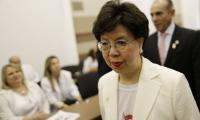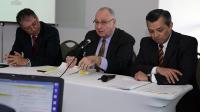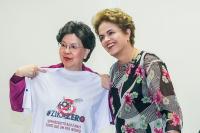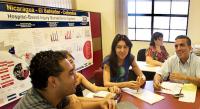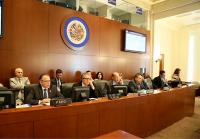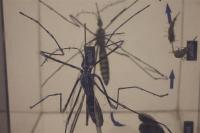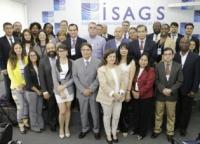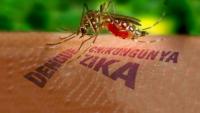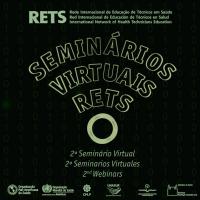You are here
News
-
02/29/2016 - At the press conference rounding off an exhaustive agenda, a visibly moved World Health Organisation Director-General described her visit to the Pernambuco Maternity and Children’s Institute (IMIP). “What I found there were mothers devoted to their children, and health professionals doing everything possible to make them safe”, she revealed. Alongside Brazil’s Minister of Health, Marcelo de Castro, and Pan-American Health Organisation Director, Carissa Etienne, Chan appeared before journalists from all over the world after touring the Oswaldo Cruz Foundation (FIOCRUZ), the institution leading Brazil’s efforts to combat the threat from the Zika virus.
-
02/29/2016 - The IAEA will facilitate the transfer of a gamma cell irradiator to Brazil to help the country’s battle with the Zika virus, the Agency announced at an expert meeting in Brasilia today. It could, in a few months, help scale up the production of sterile male mosquitoes to be released in selected areas of the country mostly affected by the current Zika virus outbreaks.
-
02/25/2016 - The Director General of the World Health Organization (WHO), Margaret Chan, and the Director of the Pan American Health Organization (PAHO), Carissa F. Etienne , met yesterday with the president of Brazil, Dilma Rousseff and Brazilian authorities to learn about the actions taken by Brazil in response to infection by the virus Zika.
-
02/22/2016 - The Pan American Health Organization (PAHO) and the EQUATOR Network have launched their newest collaborative project to promote quality health research in the Americas: aPortuguese interface of the EQUATOR website that will translate key material on good research reporting and bring together existing Portuguese translations of reporting guidelines.
-
02/22/2016 - The Assistant Director of the Pan American Health Organization (PAHO), Dr. Francisco Becerra, reported on the actions the organization is taking in the Zika virus outbreak to the Permanent Council of the Organization of American States.
-
02/15/2016 - UNFPA, the United Nations Population Fund, is closely monitoring the outbreak of the Zika virus and warning about its potentially adverse effects on the health of women and babies, particularly in Latin America. We are also closely monitoring its possible spread to other regions.
-
02/04/2016 - European countries were called on today by the United Nations World Health Organization (WHO) to act early and in a coordinated way to protect the region from Zika virus, just one day after another case was confirmed in the United States.
-
02/03/2016 - The South American Institute of Government in Health (ISAGS/UNASUL) has opened candidate nominations for executive director. The Ministries of Health of the member countries of the Bloc must send their candidatures to the Institute‘s office by March 3.
-
02/03/2016 - The Director of the Pan American Health Organization/World Health Organization (PAHO/WHO), Dr. Carissa F. Etienne, will brief ministers of health from nearly a dozen Latin American countries this week on the current state of the Zika virus outbreak, and the cases of microcephaly—unusually small head size in newborns--and other complications that are suspected of being linked to Zika virus infections.
-
02/02/2016 - The International Network of Health Technicians Education (RETS) promoted, on July 9 2015 the Virtual Seminar on “Health surveillance and primary care: territory and local practice”. The theme was presented by the teacher-researcher Grácia Gondim. The event targets researchers, students and professionals in the field of health sciences.

